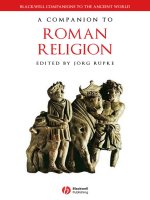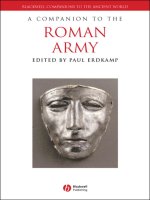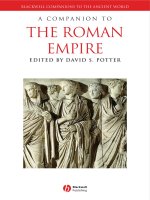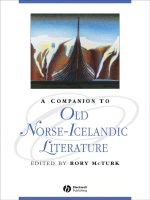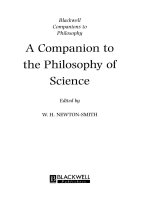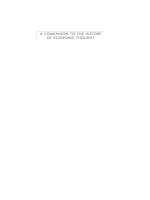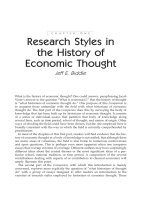A companion to APOLLONIUS RHODIUS
Bạn đang xem bản rút gọn của tài liệu. Xem và tải ngay bản đầy đủ của tài liệu tại đây (20.84 MB, 380 trang )
A COMPANION TO APOLLONIUS RHODIUS
MNEMOSYNE
BIBLIOTHEGA CLASSIGA BATAVA
COLLEGERUNT
H. PINKSTER • H.W. PLEKET
CJ. RUIJGH • D.M. SCHENKEVELD - P H . SCHRIJVERS
BIBLIOTHECAE FASCICULOS EDENDOS CURAVIT
CJ. RUIJGH, KLASSIEK SEMINARIUM, OUDE TURFMARKT 129, AMSTERDAM
SUPPLEMENTUM DUCENTESIMUM DECIMUM SEPTIMUM
TH. D. PAPANGHELIS & A. RENGAKOS (EDS.)
A COMPANION TO APOLLONIUS RHODIUS
A COMPANION TO
APOLLONIUS RHODIUS
EDITED BY
THEODORE D. PAPANGHELIS
AND
ANTONIOS RENGAKOS
ft
BRILL
LEIDEN • BOSTON • KOLN
2001
This book is printed on acid-free paper.
Library of Congress Cataloging-in-Publication Data
A companion to Apollonius Rhodius / edited by Theodore Papanghelis
and Antonios Rengakos.
p. cm. — (Mnemosyne, bibliotheca classica Batava.
Supplementum, ISSN 0169-8958; 217)
Includes bibliographical references and index.
ISBN 9004117520 (cloth : alk. paper)
1. Apollonius, Rhodius. Argonautica.. 2. Greek poetry, Hellenistic-History and criticism. 3. Epic poetry, Greek—History and criticism.
4. Argonauts (Greek mythology) in literature. S.Jason (Greek mythology)
in literature. 6. Medea (Greek mythology) in literature.
PA3872.Z4C66 2001
883.01—dc21
2001025887
CIP
Die Deutsche Bibliothek - CIP-Einheitsaufnahme
A companion to Apollonius Rhodius / ed. by Theodore Papanghelis and
Antonios Rengakos. - Leiden ; Boston ; Koln : Brill, 2001
(Mnemosyne : Supplementum ; 217)
Erscheint unregelmaBig. - Friiher Schriftenreihe. - Bibliographische
Deskription nach 208 (2000)
ISBN 90-04-1175 2-0
ISSN 0169-8958
ISBN 9 0 0 4 1 1 7 5 2 0
© Copyright 2001 by Koninklijke Brill JW, Leiden, The Netherlands
All rights reserved. No part of this publication may be reproduced, translated, stored in
a retrieval system, or transmitted in any form or by any means, electronic,
mechanical, photocopying, recording or otherwise, without prior written
permission from the publisher.
Authorization to photocopy itemsfor internal or personal use
is granted by Brill provided that the appropriate fees are paid directly
to The Copyright Clearance Center, 222 Rosewood Drive, Suite 910
Danvers 01923, USA. Fees are subject to change.
PRINTED IN THE NETHERLANDS
CONTENTS
List of Contributors
Editors' Introduction
Theodore Papanghelis and Antonios Rengakos
1. Outlines of Apollonian Scholarship 1955-1999
Reinhold F. Glei
2. The Textual Tradition of the Argonautica
Gerson Schade and Paolo Eleuteri
3. Myth and History in the Biography of Apollonius
Mary R. Lefkowitz
4. Hellenistic Chronology: Theocritus, Callimachus, and
Apollonius Rhodius
Adolf Kohnken
5. The Poetics of Narrative in the Argonautica
Richard Hunter
6. Apollonius Rhodius as "Inventor" of the Interior
Monologue
Massimo Fusillo
7. The Similes of Apollonius Rhodius. Intertextuality
and Epic Innovation
Bernd Effe
8. "Homeric" Formularity in the Argonautica of Apollonius
of Rhodes
Marco Fantuzzi
9. Apollonius Rhodius as a Homeric Scholar
Antonios Rengakos
10. Apollonius as a Hellenistic Geographer
Doris Meyer
11. Apollonius and Virgil
Damien P. Nelis
12. "Est deus in nobis . . .": Medea meets her Maker
Edward J. Kenney
13. Echoes and Imitations of Apollonius Rhodius in Late
Greek Epic
Francis Vian
vii
xi
1
27
51
73
93
127
147
171
193
217
237
261
285
VI
CONTENTS
14. The Golden Fleece. Imperial Dream
John K. Newman
309
Bibliography
Index
341
361
LIST OF CONTRIBUTORS
Bernd Effe is Professor of Greek Philology at the Ruhr-Universitat
Bochum, Germany. Main research interests: Greek Epic; Greek
Drama; Didactic poetry; Hellenistic Poetry (esp. Theocritus and
Bucolic poetry); Greek Novel; Ancient Myth; Ancient Philosophy
(esp. Plato and Aristotle); Narratology; Historical Anthropology;
Literary Theory.
Paolo Eleuteri is Professor of Codicology at the University of Venice.
Main research interests: catalogues of manuscripts as well as text
history and Nachleben of ancient literature in the Middle Ages and
the Renaissance. His publications include: Storia della tradizione manoscritta di Museo (1981), Scrittura greca nell'Umanesimo italiano (1991, with
P. Canart), / manoscritti greci della Biblioteca Palatina di Parma (1993),
and Repetitorium der griechischen Kopisten 800—1600, vol. Ill (1997, with
E. Gamillscheg and D. Harlfinger).
Marco Fantuzzi teaches Ancient Greek Literature at the University
of Macerata. He has published widely in the field of Greek Literature,
particularly Hellenistic poetry: his publications include a commentary
on Bion of Smyrna, Adonidis epitaphium (1985), and Ricerche su Apollonio Radio:
diacronie della dizione epica (1988). He also co-edited with R. Pretagostini
Struttura e storia dell'esametro greco, I—II (1995—6). A book on Hellenistic
poetry, written jointly with R. Hunter, is forthcoming.
Massimo Fusillo is currently Associate Professor of Comparative
Literature at the University of L'Aquila (Italy). His interests lie chiefly
in ancient novel, narrative theory, contemporary reception of Greek
tragedy and thematic criticism. His major works are: // tempo delle
Argonautiche (1985), // romanzo greco: Polifonia ed eros (1989; under the
title Naissance du roman, 1991); La Grecia secondo Pasolini. Mito e cinema
(1996); L'altro e lo stesso. Teoria e storia del doppio (1998).
Reinhold F. Glei is Professor of Classics at the Ruhr-Universitat
Bochum, Germany. He is the author of Die Batrachomyomachie; synoptische Edition und Kommentar (1984) and Der Vater der Dinge. Interpretationen
Vlll
LIST OF CONTRIBUTORS
zur politischen, literarischen und kulturellen Dimension des Krieges bei Vergil
(1991). He has published (with Stephanie Natzel-Glei) a German
translation of the Argonautica of Apollonius (1996). He is also the editor (with M. Kohler) of the Vellus Aureum, a Neo-Latin poem written in 1431 by the Italian humanist Maffeo Vegio (1998). He is
currently working on the reception of Apollonius from the Renaissance
to the 20th century.
Richard Hunter is Regius Professor of Greek at the University of
Cambridge and a Fellow of Pembroke College. His books include
The Argonautica of Apollonius: Literary Studies (1993) and Theocritus and
the Archaeology of Greek Poetry (1996), and he has written commentaries
on Argonautica book 3 (1989) and a selection of Theocritus' poems
(1999). He is the Editor of The Journal of Hellenic Studies.
Edward J. Kenney is Emeritus Kennedy Professor of Latin at the
University of Cambridge. His publications include a critical edition
of Ovid's amatory works (1961, 2nd corrected ed. 1995); editions
with commentary of Lucretius' De Rerum Natura III (1971), Apuleius'
Cupid & Psyche (1990), and Ovid's Heroides (XVI-XXI) (1996); a translation with introduction and notes of Apuleius' Golden Ass (1998), and
a historical monograph, The Classical Text (1974; Italian translation
by Aldo Lunelli 1995). He is at present working on a commentary
on Ovid, Metamorphoses VII—IX.
Adolf Kohnken is Professor of Greek at the University of Miinster.
He is the author of Apollonios Rhodios und Theokrit (1965) and Die
Funktion des Mythos bei Pindar (1971). He has also published on Homer,
Pindar, Hellenistic poetry, narratology, historiography (Herodotus,
Thucydides, Tacitus), drama (Euripides, Aristophanes), Aristotle's
Poetics and the history of Classical Philology. He is co-editor of Texte
und Kommentare, de Gruyter, Berlin.
Mary Rosenthal Lefkowitz is Andrew W. Mellon Professor in the
Humanities at Wellesley College. She is the author of two books
about fictional biography The Lives of the Greek Poets (1981) and FirstPerson Fictions (1991). Her recent Not Out of Africa: How Afrocentrism
Became an Excuse to Teach Myth as History (1996) is about revisionist
histories of the ancient world currently being written and taught in
the United States. She is also co-editor (with Guy MacLean Rogers)
of Black Athena Revisited (1996).
LIST OF CONTRIBUTORS
IX
Doris Meyer is a classicist and "Wissenschaftliche Mitarbeiterin" in
the research project "Mythische und historische Interpretation des
Raumes in der geographischen Lehrdichtung der Antike im Zusammenhang mit dem Editionsvorhaben FGrHist V (Geographen)" of
the Department of Ancient History, University of Freiburg. Publications:
Inszeniertes Lesevergnugen. Die Reception des inschriftlichen Epigramms bei
Kallimachos (1995); various articles of hers on Hellenistic literature
have been published in Hellenistica Groningana 1, 1993; ScriptOralia 61,
1995 and 95, 1998; Antike Naturwissenschaft und ihre Reception 8, 1998.
Damien P. Nelis has taught in the University of Fribourg (Switzerland)
and in the University of Durham (UK). He is currently Professor of
Latin in Trinity College Dublin. He is the author of a number of
articles on Apollonius and on Virgil and his book Vergil and Apollonius:
the Aeneid and the Argonautica will be published soon in the ARCA
series directed by Professor Francis Cairns. He is currently working
on a book provisionally entitled Argonautica: Studies in Apollonius and
his influence.
John Kevin Newman is Professor of Classics at the University of
Illinois, Urbana. His publications include: Augustus and the New Poetry.,
1967; The Concept of Vates in Augustan Poetry, 1967; Latin Compositions,
1976; The Classical Epic Tradition, 1986; Roman Catullus, 1990; Augustan
Propertius, 1997. He has also published Pindar's Art: Its Tradition and
Aims with Dr. F. S. Newman (1984) and edited Latin Poems of Lelio
Guidiccioni (1992). With Professor A. V. Carozzi he has edited an
18th-century Latin treatise on the origin of glaciers: Horace-Benedict
de Saussure: Forerunner in Glaciology, 1995. He has published a number
of original Latin poems.
Antonios Rengakos is Professor of Greek Literature at the Aristotelian
University of Thessaloniki.
Gerson Schade has studied Classics and Comparative Linguistics at
the Universities of Berlin, Cambridge, and Hamburg. He is a Humboldt
scholar at the University of Venice. He has published Lykophrons
'Odyssee': Alexandra 648-819 (1999).
Francis Vian, Professor Emeritus at the University of Paris X, is the
editor (in Collection des Universites de France] of Quintus Smyrnaeus,
Posthomerica (3 vols, 1963-1969), Apollonius of Rhodes, Argonautica
X
LIST OF CONTRIBUTORS
(with E. Delage, 3 vols, 1976-1981) and the Orphic Argonautica (1987).
Since 1976 he has been working with others on the Dionysiaca of
Nonnus of Panopolis (twelve out of the planned eighteen volumes
have appeared so far). He is also the author of several works on
Greek mythology, notably the Guerre des Geants (1952) and Les Origines
de Thebes (1963).
EDITORS' INTRODUCTION
The long process of re-assessment of Apollonius' Argonautica may have
started when readers with a soft spot for romance like Sainte-Beuve
saw fit to celebrate the Jason-Medea love affair to the exclusion of
almost everything else; yet long after Sainte-Beuve enthused over
book 3 and wished the poem had ended before the enamoured
princess went on to acquire a criminal record, one could still with
good reason complain that the sole Hellenistic epic to come down
to us unscathed was receiving less critical attention than it deserved.
A quick glance at the literature which has been encrusting the
Argonautica over the last three decades or so will confirm that, whatever desiderata and gaps there may still be, any such complaint
would be more or less churlish today. Whether as beneficiary of the
changed ways in which post-classical literary products are now being
studied or as a composition whose intrinsic value has at last dawned
upon readers, the Argonautica now looks like one of those Hellenistic
growth industries; and when Apollonius is deemed unconventional
enough to be credited (or discredited, as the case may be) with
"deconstructionist" instincts, one may suspect that rehabilitation of
his epic has come with a vengeance.
Some preconceptions had to be overcome before Apollonius could
come into his own; one was that he cherished Homeric aspirations
and endeavoured to write an orthodox epic but then, having failed
to keep up Homeric standards (especially in terms of unity), fell flat
on his face. That Aristotelian unity or depiction of straightforward
epic heroism may not have been the poet's overriding concern is
the kind of "modernist" idea which few scholars would reject out of
hand today. But this is not necessarily the result of the majority of
Apollonius' students having jumped on the bandwagon of avantguarde hermeneutics. As in the case of other Hellenistic poets,
informed re-evaluation of Apollonius' poetic aims owes a great deal
to a realisation of which traditionally trained classical scholars should
be capable par excellence, namely that, much like Callimachus and
for much the same literary-historical, social and personal reasons,
Apollonius operated as a scholar as well as a poet. And post-classical
poets who are at the same time librarians or habitues of a great
Xll
EDITOR'S INTRODUCTION
library are nothing if not self-conscious—self-conscious about their
place in the literary tradition, about the way they use poetic language and metre, about the norms and codes of their chosen genre,
about the aesthetic and ideological implications of recounting what
others, working under different circumstances and with different social
and literary perspectives, had recounted before them.
All of these issues, and much else besides, have loomed large in
recent and current research on Apollonius; and as a result, new critical perspectives on the Argonautica have been won, especially where
sound scholarship and a wider theoretical awareness have combined
to focus on the dynamics of the epic's new narrative modes, the
manifold implications of its dense intertextuality with previous and
contemporary literature and the crucial relation between its form
and cultural background.
As it happens, Apollonius was the honorand of the fourth Groningen
"Workshop on Hellenistic Poetry" held in 1998. The well-attended
conference, whose papers are due to be published soon, confirmed
that, along with Callimachus and Theocritus who were the subjects
of the first two workshops in 1992 and 1994 respectively, Apollonius
is increasingly popular with senior scholars and younger research students alike; that important aspects of his epic technique are currently
being brought into sharper focus; and that, naturally, much remains
to be done.
The principal aim of the present volume is to offer a survey of
some of the major issues recently discussed and currently under
examination among specialists on Apollonius. In such projects one
quickly gives up the idea of exhaustiveness, both for intrinsic and
practical reasons. We have, however, tried to be as comprehensive
as possible in the sense that the papers collected here cover a wide
range of research areas from the history of the Argonautica text, the
poet's biography and trends in Apollonian bibliography, through individual aspects of poetic technique to questions of reception and
Nachleben. Now that the book is finally completed, we are happily
confirmed in our hope that readers of the volume will find both a
fairly representative picture of the state of Apollonian scholarship
and a stimulus to further exploration and elaboration.
In bringing this volume to publication we have incurred many debts.
We wish to express our gratitude to Professors Hans-Christian Giinther,
Richard Hunter, EJ. Kenney, Mary Lefkowitz, George Parassoglou
EDITOR'S INTRODUCTION
Kill
and to Assistant Professors T. Kouremenos and P. Kyriakou for their
valuable help and advice on linguistic and editorial matters. It goes
without saying that any remaining defects, inaccuracies and obstinacies should be laid at the editors' door. Thanks are also due to
the staff of Brill Academic Publishers for the care they have expended
on the preparation of the book and for their polite and efficient
cooperation, especially to Ms Marcella Mulder, Ms Loes Schouten
and Mr Michiel Klein Swormink. Professor Annette Harder kindly
allowed us to see the papers of the Groningen Workshop on Apollonius,
still unpublished as these lines were being written. But the place of
honour in our acknowledgements belongs to our Argonautic crew
itself. It may not be presumptous to say that their rallying had something to do with the fact that, after all these centuries, the summons
issued once again from Argo's original home. Although the editors
may be thus romantically deluding themselves, they are profoundly
grateful for the alacrity of the response.
Theodore D. Papanghelis and
Antonios Rengakos
Thessaloniki, March 2001
This page intentionally left blank
OUTLINES OF APOLLONIAN SCHOLARSHIP 1955-1999
Reinhold F. Glei
Preliminary Remarks
In the last 10—15 years the stream of scholarly studies on Apollonius
has swollen considerably: whereas in the period 1955-1965 the Annee
Philologique lists only a handful of entries per year, between 1985-1995
the number of studies exceeds a dozen per year and the rate is
increasing. Scholars that row against this current feel as if they were
sailing through the Clashing Rocks; they have barely struggled halfway
through one wave and there rolls the next one tossing them backwards twice as far as they had progressed. One should then throw
ballast overboard, muster courage and trust in divine assistance! Even
if the attempt to pass through the clashing mountains of books succeeds, there is no hope of a pause and scholars find themselves in
the grip of a debilitating d^itixocvia. Enough of metaphors! For the
above reasons a survey of recent scholarship is as much necessary
as it is long overdue, and coinciding as it does with the end of the
millennium it certainly offers an opportunity to take stock.
Starting from 1955, this survey continues the last Forschungsbericht
of Apollonian studies since 1921 by Hans Herter (Bursians Jahresbericht
Nr. 285 [1944-55]) without, however, being comparable with it in
either methodology or scope: the nature of this "Companion" and,
especially, the limitations of this author will only allow an "outline",
i.e. a preliminary overview of the trends that have informed Apollonian
scholarship in the last 40—45 years. A focus on the areas that attract
most attention is, therefore, necessary; less studied areas will be left
out of consideration. Specialized studies on textual problems, the history of the text, metre and language, as well as studies on brief
episodes or passages of the Argonautica and other works of Apollonius
will not be discussed here. Not included either are studies on the
influence of the Argonautica, especially the relation between Apollonius
and Valerius Flaccus, for whereas scholarship on Valerius has in the
meanwhile advanced considerably, the reception of Apollonius by
other authors has not yet been adequately studied. Some studies on
this topic are fortunately included in this volume.
2.
REINHOLD F. GLEI
The volume of secondary literature and the partly subjective choices
of the author have determined the scope of the outline of the following areas. It should also be apologetically noted that the attempt
to spice up here and there a dry survey of secondary literature may
have occasionally led to pointed judgments and turns of phrase that
not all readers will find to their taste. I ask for forbearance.
1. Editions, Commentaries, Translations
In the history of the scholarship on Apollonius and the reception of
his epic book 3 of the Argonautica has constantly been the focus of
attention; editions and commentaries are no exception. The most
recent edition with commentary (Hunter [1989a]) as well as the first
one in the period under survey are of book 3: Ardizzoni (1958) leads
off the dance, launching with book 3 a planned edition of the entire
Argonautica (with Italian translation and some linguistic notes). Vian
(1961) follows soon thereafter, again with an edition of book 3 which
later developed into a complete edition of the Argonautica. Frankel's
magisterial new Oxford edition (1961) came out in the same year.
Being the starting point for rather than the end product of reflection
on the text, it has influenced all subsequent work on the text of
Apollonius. With a fine feeling for textual problems, Frankel produced a "dynamic" edition which has lost nothing of its brilliance
nearly 40 years after it appeared. As the OCT edition allowed only
a short Praefatio, an Einleitung zur kritischen Ausgabe (Frankel [1964]),
justifying in detail the constitution of the text, was soon published
separately. There follow the edition of book 1 by Ardizzoni (1967),
whose planned edition of the entire epic remained unfinished, and
Livrea's edition (1973) of the previously neglected book 4. Vian's is
the second important edition of the Argonautica in the period under
survey: books 1 and 2 came out first (Vian [1974]), books 3 and 4
were published later (Vian [1980, 1981]). A decisive advance over
Frankel's edition lies in the greater number of sources for the constitution of the text (especially the many papyri); at the same time,
many of Frankel's lumina ingenii were lost sight of through a very
conservative approach to the text. This is not the place to decide
upon the methodological dispute between the "Anglo-Saxon" and
the "Continental" traditions; both approaches have their merits and
as a consequence both editions are necessarily complementary. It is
OUTLINES OF APOLLONIAN SCHOLARSHIP 1955"!999
3
perhaps preferable to retain both rather than unify them in a "superedition" and thereby rob them of their distinct characters.
The commentators of Apollonius also owe a substantial debt to
Frankel and Vian. FrankePs Noten (1968) are a milestone—they are
not a commentary in the usual sense of the term but an extremely
rich collection of material concerning most of the issues raised by
the interpretation of Apollonius, and they are still today an inexhaustible treasure-trove of incisive and stimulating, sometimes even
strange, observations which can be profitably consulted with the help
of a detailed index. The commentary in Vian's edition (1974-81) is
more traditional but unfortunately not very user-friendly, because of
the usual division of a Bude edition into preliminary notes ("Notices"),
footnotes and "Notes complementaires". Among the commentaries
on individual books there stand out Livrea (1973) on book 4 with
almost excessively rich material, Hunter (1989a) on book 3 with
shorter, readable explanations that concentrate on the essentials, and
finally Campbell (1994) on the first 471 lines of book 3 with sometimes unnecessarily exhaustive details. Other helpful tools are
Campbell's Index Verborum (1983b) and the Apollonius dictionary by
Reich—Maehler (1991-97)—of which only the first three fascicles
have appeared so far.
Available also are modern translations of the complete Argonautica
in the major languages of classical scholarship: besides the quite free
English translation by Rieu (1959) there are now two accurate modern English translations by Hunter (1993b) and Green (1997a) which
will remain the standard English translations for a long time; the
same holds for the French translation by Delage—Vian (1974-81).
Pompella's accurate Italian translation (1968, 1970) is based on the
old Oxford edition by Seaton (1900) whereas the more recent Italian
translation by Paduano (1986) is based on the Bude text. Finally,
there is at last a translation in contemporary German prose by
Glei—Natzel-Glei (1996)—before, one had to make do with the oldfashioned verse translation by von Scheffer (1940).
In general, the most important goals of scholarship in this area
may be considered already achieved. For the reasons given above,
a new critical edition combining the approaches of Frankel and Vian
would make little sense. Desirable as it is in itself, a commentary on
the entire Argonautica would certainly grow into an immense work
(projecting from Campbell [1994], one reaches the exorbitant estimate of 5.250 pages!) and at this juncture new translations in the
REINHOLD F. GLEI
above languages seem superfluous. Therefore, all editors, commentators and translators should be advised to wait at least 50 years
before any such undertaking is worthwhile again.
2. Aesthetics: The Quarrel between Apollonius and Callimachus
One of the major problems in Apollonian scholarship is the relationship between the Argonautica and Callimachean poetics: did
Apollonius consciously distance himself from the poetic theory of
Callimachus by composing an epic or does the particular character
of the Argonautica suggest an attempt to apply Callimachean principles to the epic? If, further, the latter is the case, did Callimachus
welcome Apollonius' attempt and savour its outcome or did he consider the Argonautica as an artistic failure, perhaps even flawed in
principle?
Most scholars try to decide these issues from within the Argonautica
and by detecting intertextual relations with relevant Callimachean
passages (Hymn to Apollo., the Aitia prologue, Ibis}. The issue has only
grown hotter in view of the reports in ancient Vitae about a quarrel between Callimachus and his "student" Apollonius who, upset by
a failed recital of the Argonautica in Alexandria, retreated to Rhodes.
In the period under survey Eichgriin (1961) is the main advocate of
the traditional approach which, in principle, takes the Vitae at face
value and, relating the polemics in the Callimachean works to
Apollonius, follows Callimachus in branding the Argonautica as a poetic
failure (regularly faults are lack of unity, the episodic character of
the epic and excessive learning). The rejection of this interpretation
is one of the most important advances in the Apollonian scholarship
of the last 40 years. Already Erbse (1955) expressed strong doubts
as to whether it is the Argonautica that Callimachus attacks with the
image of the muddy river in the Hymn to Apollo, but no one paid
attention at the time (Huxley's mistaken thesis [1971] that the river
alludes to Apollonius' description of Thermodon can be left aside
here). The debate over the poetological position of the Argonautica
started seriously again only 20 years later: in two short articles spun
out of his unpublished 1974 dissertation Klein (1975, 1976) rejected
vigorously—though by stating rather than arguing his thesis—any
discrepancy between the poetics of the Argonautica and Callimachus.
OUTLINES OF APOLLONIAN SCHOLARSHIP 1955^999
5
Subsequently Lefkowitz (1980) showed in a groundbreaking study
that ancient reports of a quarrel between Callimachus and Apollonius
will hardly stand close examination; the rug was pulled from under
the traditional reading of the Callimachean passages.
Moreover, this interpretative shift coincided with a radical reevaluation of the heroism in the Argonautica; the "anti-heroic" dimension,
to which such reevaluation pointed, is a feature whose "Callimacheanism" (sit venia verbo] also became canonical (more details in 3,
below). The fatal blow to the tale of a quarrel between Callimachus
and Apollonius was finally delivered by Rengakos (1992a): in a detailed
article that will hopefully end the debate he has shown that reports
of the quarrel, when they do not arise out of misunderstanding, are
later inventions or speculations. As a consequence, DeForest's book
(1994) is titled Apollonius' Argonautica: A Callimachean Epic, which does
not sound paradoxical any more, and puts forth a new interpretation of the epic (it will also be discussed in 3, below). Articles such
as Kahane (1994) or Albis (1995) can be left aside in this context.
In general, the new communis opinio is that Apollonius attempted
with the Argonautica a radical renewal of the Homeric epic in terms
of Callimachean aesthetics and that his attempt was successful. The
Argonautica must indeed be called "a Callimachean epic" and as such
must also have enjoyed the approval of the supreme arbiter elegantiae
in Alexandria. There is no trustworthy evidence for Apollonius' quarrel with Callimachus and his "exile" in Rhodes; it is much more
probable that as a young man Apollonius "Rhodius" came to the
Mouseion in Alexandria, the cultural metropolis, where he became
a "student" (or rather a younger colleague) of Callimachus and then
succeeded Zenodotus as librarian and tutor of the royal prince. The
date of the composition of the Argonautica must remain an open issue;
the relative chronology of the Argonautica, Callimachus' Aitia and
Theocritus (see below 6) is problematic in itself and cannot be determined with any certainty.
It is, therefore, evident that here too the central issues, to the
extent that they can be settled, should be considered settled. The
fragmentary state of Callimachus' works makes a precise study of
the intertextual relationships between them (especially the Aitia) and
the Argonautica a difficult, if not impossible, task. Here too further
progress is contingent on the considerable broadening of our knowledge of the relevant texts.
O
REINHOLD F. GLEI
3. Heroism: The Argonautica and the Conception of the Epic Hero(es)
The main issue in the Argonautica scholarship of the last 50 years is
the conception of the epic hero. Carspecken (1952) showed in a seminal study that the ideals of the Homeric hero do not apply to
Apollonius' heroes: his Argonauts, on the one hand, differ fundamentally from the Iliadic warriors, who fight for Tifir) and apern, as
well as from TroXmpOTicx; '08-uaaeix; and, on the other, should not be
compared with the paradigmatic hero of the later Augustan epic,
the pius Aeneas. What kind of heroes, then, are the Argonauts and
especially Jason? The fact that the Argonauts are a diverse group
which includes completely different characters makes the answer to
this question difficult. Which hero embodies the heroic ideal of
Apollonius, granted that such an ideal exists?
The impetus to the discussion was given by no lesser a scholar
than Frankel. In an early article (1957) he attempted to characterize the uniqueness of the Argonautica in terms of Fixierung and Intimitdt.
The former captures the grounding of mythical events in the reality of the poet and the reader so that the larger-than-life heroes are
reduced to ordinary human standards; the latter picks out the portrayal of epic characters also in "intimate" situations that reveal their
inner, emotional world. What is important for the problem of heroism is that this intimacy applies not only to the protagonist Medea
but also to the Argonauts, who are repeatedly shown in a desperate, depressed mood. Frankel tackled the same issue again in a later
article (1960): his main thesis was that the old bully Idas is a foil to
Jason, the atypical modern hero, intended to demonstrate ad oculos
the obsolescence of the archaic warrior. This view is certainly problematic, despite the impetus it provided: apart from the unfortunate
comparison of Idas with Don Quijote, Idas cannot be self-evidently
identified with the "archaic" (i.e. Homeric) hero because he is no
proud paoiAeiix; but an insignificant, uncouth lout, an offender of
the gods (the model for Virgil's Mezentius!) and at best a caricature
of the Homeric hero—the Thersites of the Argonautica. To this extent
Idas can be a foil to the modern hero Jason only in a very limited
sense; much more suitable for this role is naturally Herakles, who
will be discussed below. Vian (1963a) attempted to broaden the
debate about Apollonius' "renewal" of the epic by going beyond the
issue of heroism to, among other things, the role of women, but his
attempt remained isolated. The time was not yet ripe for a discussion of the role of women.
OUTLINES OF APOLLONIAN SCHOLARSHIP I955~I999
7
It was, however, ripe for a pacifist approach: with some delay,
the Zeitgeist of the mid-60's influenced the scholarship on Apollonius
and the "anti-hero" Jason came into fashion. A seminal study by
Lawall (1966) argued that in their various "heroic" capacities all
Argonauts—not only Idas—are foils to the "anti-hero" Jason who at
the end comes across as the only real hero (on account of his success). Herakles' brute strength represents the more primitive stage of
an anachronistic conception of heroism that has no place in the
Argonautica; for this reason Herakles must part company with the
Argonauts relatively early in the epic. Thanks to their t£xvr|, Tiphys
and other Argonauts are on a higher level but without divine help
they fail (the passage through the Clashing Rocks); skill and might
cannot guarantee anything. Telamon and Peleus are positive characters who embody fighting prowess; however, prowess, especially
when devoid of good judgement (as in the Kyzikos episode), can
lead to disaster and does not help to accomplish the main objective, namely the abstraction of the Golden Fleece. Finally, the fate
of the seers Mopsos and Phineus, and especially the tragic fate of
Idmon, show that even the relationship to the divine powers is not
unproblematic. The assistance of the Olympian gods is necessary
and occasionally guaranteed, but in the decisive struggle chthonic
forces must also be mobilized. Moreover, the murder of Apsyrtos
shows that sometimes only a godless deed can bring about success.
Against the background of various other conceptions of the hero,
Jason comes off as a pragmatic and opportunistic antihero who
employs any necessary aid (including Medea's) that the situation
might demand. That the success of the Argonautic expedition depends
on such a hero reflects for Lawall Apollonius' pessimistic worldview.
A similar approach is adopted by Beye (1969) who talks not of an
"anti-hero" but of a "love-hero". Beye thus emphasizes more strongly
than Lawall the role of love and sexuality in the Argonautica and occasionally tries his hand at a Freudian interpretation (the Fleece as a
symbol for Medea's virginity). Jason, however, appears not as a Don
Juanesque lover but as a bizarrely passive, desirable sexual object
(Hypsipyle, Medea); in his helplessness (d|ir|%av{rj) he appears consistently unheroic. His success despite (or exactly because of) his
unheroic behaviour shows, for Beye also, Apollonius' fundamentally
pessimistic attitude.
Predictably, scholars on this side of the Atlantic have not been
influenced by the above approaches and have retained a rather traditional stance, as is shown for example by Adamietz's interpretation
O
REINHOLD F. GLEI
of the Jason and Herakles figures (1970). His approach, however,
extrapolates from Valerius Flaccus: under the influence of Virgil the
Flavian epic poet has a more positive conception of the hero which
colours Adamietz's reading, though Adamietz should have emphasized exactly the fundamental difference between the two epics.
In his comprehensive study of the Herakles theme Galinsky (1972)
approaches the Herakles of Apollonius as a necessary foil to Jason,
a "stone-age relic" representing an obsolete heroic ideal. According
to Galinsky, one should not view Jason and Herakles as morally
opposite because both have positive as well as negative characteristics; as an epic poet Apollonius is reticent on moral values. By pointing out this ambivalence Galinsky was ahead of his time. His thesis
was much later adopted by Klein (1983) and Hunter (1988). The
essayistic chapter in Heiserman (1977) shows the transient nature of
trendy "literary criticism": the author combines a nai've aesthetic critique (the plot does not come to an end) with psychoanalytical dilettantism (Jason wanted to castrate Pelias and Aietes)—a definitely
lethal combination.
The next important contributions are by Vian (1978) and Zanker
(1979): Vian understands the "unheroic" in Jason and his proverbial
dcjirixaviri as positive characteristics that reflect a more contemporary heroic ideal and turn Jason into a likable "one of us". Zanker
too sees in Jason a new kind of hero with whom humanity, and
especially love, comes to the foreground. Jason's negative side is certainly not denied but (pace Lawall) definitely loses its importance.
For Zanker the main aspect of the new heroic ideal is the respect
for and the exploitation of love, a view that plays down the destructive aspects of love that also have a significant role in the Argonautica.
Zanker is, however, correct in pointing out that (as is shown by the
imitation of the Argonautica by Virgil and later epic poets) the most
important innovation of Apollonius is the introduction of the lovetheme into the epic.
Pike (1980) was the first to draw attention to the comic side of
Herakles, thereby giving fresh impetus to the debate about the epic
hero: if Herakles is a burlesque character, then his heroic persona
can be understood as all the more anachronistic. At the same time,
this view counteracts the darker, pessimistic reading of the Argonautica
which was influenced by the Vietnam war in the 60's: the comic
elements in the Argonautica had largely passed unnoticed until Pike's
short article, which marks a turning point. Along the same lines Beye
OUTLINES OF APOLLONIAN SCHOLARSHIP I955~I999
9
(1982) has put forth an interpretation of the Argonautica that duly
emphasizes the comic element—e.g. the entire Phaeacian episode is
very perceptively read as comedy (in the ancient sense of the term).
Beye's thesis of the "novelistic" character of the Argonautica is less
convincing, because on the one hand it invokes an anachronistic category and on the other Apollonius lacks exactly the sentimentality
that characterizes the later Greek novels.
The "anti-hero" Jason came somehow back to life with Klein
(1983) who sees Jason as "hero and scoundrel": characteristic for
Jason is the fundamental contradiction of his character which parallels the paradoxically epic and anti-epic nature of the Argonautica.
Klein goes beyond this plausible thesis which can be justified in terms
of the history of the genre and turns Apollonius into a philosophical sceptic who composed an epic in utramque partem, so to speak;
d|irixaviTi, the primary characteristic of the schizophrenic protagonist Jason, amounts to a sceptical virtue! Against this speculative view
it should be sceptically objected that reasoned scepticalCTOXTIhas
nothing to do with Jason's helpless cc|iT|%av{T|, which was designed
as the opposite to Odysseus' jioAA)|o,r|xav{r|.
An article by Rose (1984) takes the negative view of Jason and
the entire team of the Argonauts a step further. Its purpose is to
show through an interpretation of the Bebrykian episode that the
Argonauts' loss of civilized values begins here and intensifies as the
epic progresses (murder of Apsyrtos). Jason's behaviour toward Medea
and his victory over Aietes, the son of Helios, won again with chthonic
assistance, show the falling apart of moral order and a Nietzschean
"subversion of all values". This "destructive" reading of the Argonautica
finds its strongest version to date with Schwinge (1986): Apollonius'
portrayal of the "anti-hero" Jason captures consciously and subversively the "paralysis of the epic" and drives home the impossibility
of a heroic epic via the consequent undermining of the heroic ideal.
Schwinge lambasts Jason: he is the non-hero par excellence, a pitiful
weakling, and his heroism is a "heroism of drugs". Medea too, who
in book 3 is still a likable heroine, becomes more and more entangled
in injustice and is transformed into an abominable witch at the end
of the epic (Talos episode). In the history of scholarship on Apollonius
Schwinge's interpretation is perhaps the most radical attempt to take
the destruction of epic heroism to the extreme; it is not surprising
that later scholars did not follow him in this direction.
The credit for setting the debate on a more objective basis and

